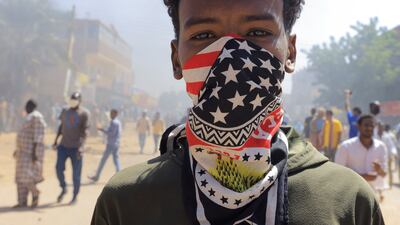A protester was killed when he was hit by a security forces vehicle during street rallies in Sudan on Tuesday, a medical group aligned with the opposition said.
The demonstrations marked the first anniversary of the military coup that upended the country’s democratic transition.
The Central Sudan Doctors Association said the victim, Abul Abdel Wahab, 20, died in Omdurman, Khartoum's twin city.
The association is known for thoroughly counting victims of political violence in Sudan in recent years.
"I dream of hearing the last gunfire shot in my country, even if it targets me," Abdel Wahab wrote on Facebook on Monday night.
In another post, he bade farewell to his friends and family and asked for forgiveness if he had wronged any of them.
"Tomorrow will not be new to us," he wrote. "We will wage a battle that history will witness. Remember us if we achieve victory."
Elsewhere in Khartoum, police used tear gas to disperse protesters approaching the Nile-side presidential palace in the heart of the Sudanese capital.
Soldiers and paramilitary units had been posted since early on Tuesday morning in anticipation of the anti-military rallies.
Waving Sudanese flags, the protesters chanted: “Soldiers, go back to the barracks” and “No partnership, no negotiation with the putschists".
Internet monitoring service NetBlocks reported “a nation-scale internet disruption in Sudan” before the protests, a measure often taken in the past by authorities on days when large demonstrations were planned.
Activists say the internet disruptions are designed to hamper attempts by protesters to organise and to help cover up human rights abuses.
At least 119 protesters have now been killed and about 6,000 injured since the coup a year ago. At least 30 people were injured in the last anti-military rallies in Khartoum on Friday.
One year on from Sudan coup - in pictures
The troops also sealed off Nile bridges linking the three towns that make up the Greater Khartoum area — Khartoum, Bahri and Omdurman — to prevent large numbers of protesters from gathering.
Authorities also ordered government offices, schools, banks and universities to close for the day.
The resistance committees, grass roots pro-democracy groups, described the demonstrations planned on October 25 as a “million-man protest” and a “continuation of the courageous struggle”.
“It will be staged under the slogan of ‘bring down the coup’ and will head to the presidential palace,” the group said.
The October 25 takeover ended a partnership between the military and the pro-democracy forces behind mass street protests in late 2018 and early 2019 that toppled dictator Omar Al Bashir’s 29-year rule.
A vast nation of 44 million people, Sudan has experienced unrest in its outlying regions since the takeover, including in the Blue Nile and Darfur regions.
The deadly violence has left at least 600 dead since January and displaced tens of thousands, the UN reported.
Sudan has also been gripped by the worst economic crisis in living memory after the West suspended billions of dollars’ worth of aid and debt forgiveness following the takeover.

It is suffering from three-digit inflation and chronic food shortages, with a third of its population now experiencing hunger — a rise of 50 per cent over 2021, according to the World Food Programme.
The cost of food staples has also soared by 137 per cent in one year, which the WFP says has forced Sudanese to spend “more than two thirds of their income on food alone, leaving little money to cover other needs”.
Gen Abdel Fattah Al Burhan, the army chief who led the military takeover and is now the head of state, insists that it was necessary to spare the country from civil war and restore the prestige of the armed forces.
But Gen Al Burhan has so far failed to form a government.
His repeated assertions that the military was prepared to step aside and let civilians name a head of state and a prime minister have been hedged by his suggestions that the army would remain as the source of ultimate power in Sudan, assuming the role of guardian and protector of the nation.
The general has also moved or chose not to challenge the reinstatement of thousands of Al Bashir supporters in government jobs and the judiciary from which they were purged.
He has also allowed them to engage in political activity, in what is widely interpreted as a reversal of the uprising against the dictator.
Gen Al Burhan has also dismissed a state, post-uprising commission mandated to dismantle Al Bashir's legacy.






















